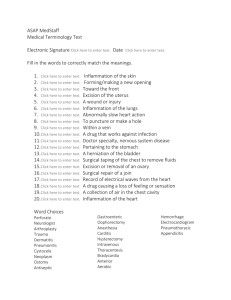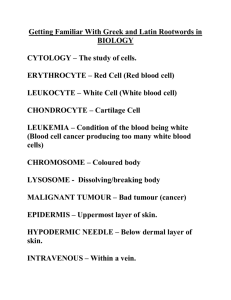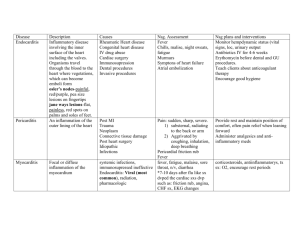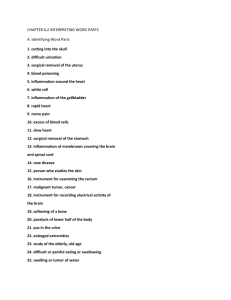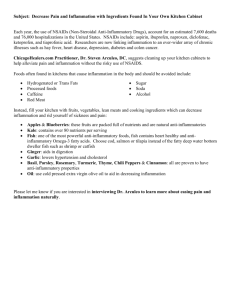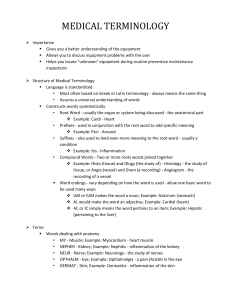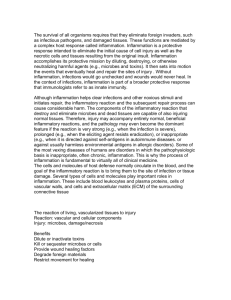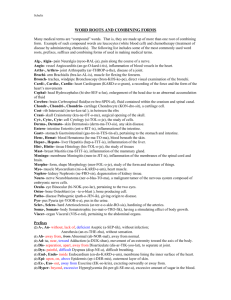19th Century Medical Terminology
advertisement
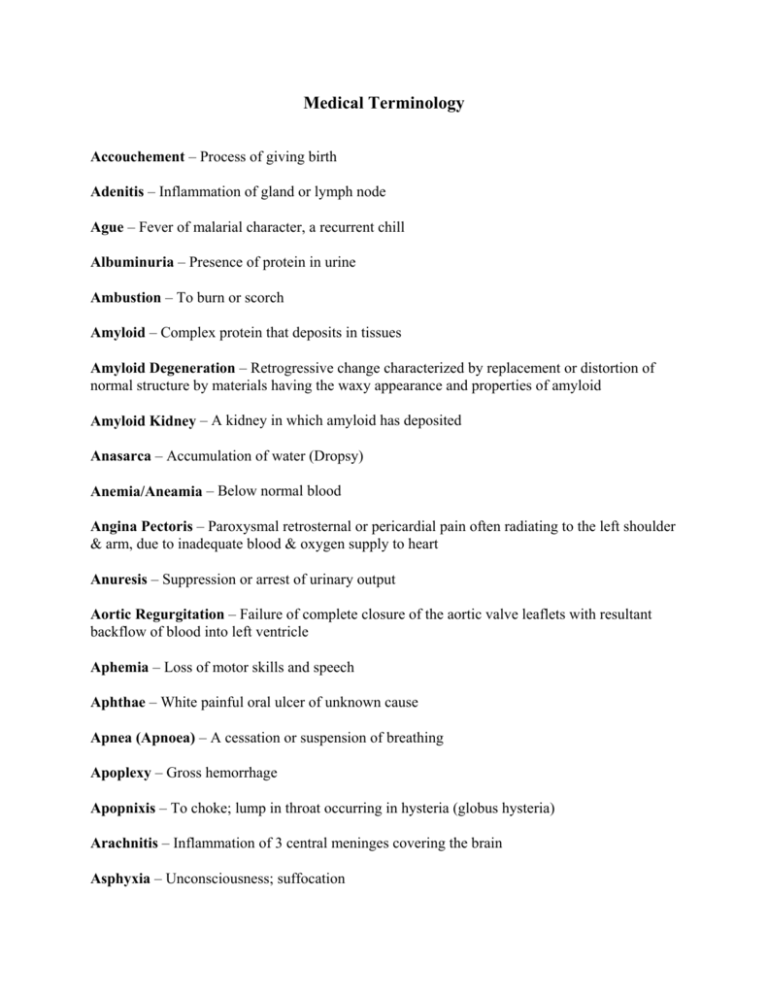
Medical Terminology Accouchement – Process of giving birth Adenitis – Inflammation of gland or lymph node Ague – Fever of malarial character, a recurrent chill Albuminuria – Presence of protein in urine Ambustion – To burn or scorch Amyloid – Complex protein that deposits in tissues Amyloid Degeneration – Retrogressive change characterized by replacement or distortion of normal structure by materials having the waxy appearance and properties of amyloid Amyloid Kidney – A kidney in which amyloid has deposited Anasarca – Accumulation of water (Dropsy) Anemia/Aneamia – Below normal blood Angina Pectoris – Paroxysmal retrosternal or pericardial pain often radiating to the left shoulder & arm, due to inadequate blood & oxygen supply to heart Anuresis – Suppression or arrest of urinary output Aortic Regurgitation – Failure of complete closure of the aortic valve leaflets with resultant backflow of blood into left ventricle Aphemia – Loss of motor skills and speech Aphthae – White painful oral ulcer of unknown cause Apnea (Apnoea) – A cessation or suspension of breathing Apoplexy – Gross hemorrhage Apopnixis – To choke; lump in throat occurring in hysteria (globus hysteria) Arachnitis – Inflammation of 3 central meninges covering the brain Asphyxia – Unconsciousness; suffocation Ascites – Accumulation of serous fluid in peritoneal cavity - a type of dropsy Asthenia – Absence or loss of strength, weakness Atelectasis – State of incomplete expansion of lungs because of their failure to expand at birth Atrophy – Lack of nourishment Axillary – Pertaining to armpit Basilar Meningitis – Inflammation of the meninges affecting chiefly the base of the brain Biliary Calculus – A solid mass formed within the biliary system, composed of bile salts, calcium, bilirubin and cholesterol in various proportions Bright's Disease – Disease causing degeneration of the kidneys Bronchorrhoea – Excessive discharge of mucous from bronchial mucous membranes Cachexia – Severe general weakness, malnutrition, emaciation Cancrum – A noma or spreading gangrene beginning in mucous membranes of mouth, nose, external auditory canals, genitalia or anus following measles in children under extremely poor conditions of hygiene & nutrition Carbuncle – Extensive deep seated spreading stubborn infection usually staphylococcal Carcinoma of Uterus – Cancer of uterus; malignant growth Carditis – Inflammation of heart Caries – Molecular death of bone or teeth Carpopedal Spasms – Spasm of hands and feet or of thumbs and great toes associated with tetany. Caseous Pneumonia – Exudative tuberculosis of lung that has undergone a characteristic type of necrosis; simulating cheese in its gross appearance Catarrhal Fever – Common cold Cellulitis – A diffuse inflammation of connective tissues especially of subcutaneous tissues Cerebritis – Encephalitis; inflammation of cerebrum Cholemia/Cholaemia – Hepatic encephalopathy, hepatic coma; the presence of bile in the blood 2 Cholic-Choleic – Pertaining to bile Chorea – Twisting of face and extremities Cirrhosis – Disease of liver Climacteric – Menopause Colliquative Diarrhoea – Profuse or excessive diarrhea Convulsions – Since so many newborns died from convulsions, we believe that the use of forceps caused damage. In older children, we believe that the old remedy for fever of "sweating it out" by adding more blankets caused the fever to rise & damaged the brain Craniotomy – Operation to reduce size of skull by cutting or breaking when delivery is otherwise impossible Cyanosis – Inadequate oxygenation of the blood (blue baby) Cynanche – Severe sore throat with choking brought on by diphtheria (quinsy) Cystitis – Inflammation of bladder Debility – Lack of Strength Delirium Tremens – Constant Tremor Dentition – Teething; we believe death was not caused by teething but rather by the incorrect administering of drugs by parents, doctors, druggists and midwives. Diaphragmitis – Inflammation of diaphragm Diarrhoea Diphtheria Dipsomania – Recurrent periodic compulsion to excessive beverages Discrasia – Abnormal state or disorder Dissipation – Excessive drinking Diuresis – Increased excretion of urine Dropsy – Accumulation of water 3 Dyspepsia – Disturbed digestion Dyspenea (Dyspnoea) – Difficult, labored breathing Dysuria – Difficult or painful urination Eclampsia – Convulsions; usually with pregnancy Edema (or Oedema) – Excessive accumulation of fluid Embolism – Blood clot Emphysema Empyema – The presence of pus in a cavity, hollow organ, or body space Encephalitis – Inflammation of brain Encephaloed – Resembling brain or brain tissue; brain like consistency Encephaloid Tumor – Brain tumor Encephaloma – Medullary carcinoma (poorly differentiated adeno-carcinoma, usually of breast) Endocarditis – Inflammation of endocardium or lining of heart cavities Endometritis – Inflammation of endometrium (mucous membrane lining of uterus) Engorgement – Completely filled or overfilled Enteric Fever – Typhoid fever Entero Colitis – Inflammation of small intestine and colon Epistaxis – Nosebleed Epithelioma – Tumor-skin cancer, occasionally cancer of mucous membrane Erysipelas – Streptococcal cellulitis of skin, St. Anthony's Fire Extravasation – Passing of body fluid out of the proper place (as blood into surrounding tissues after rupture of blood vessel) Febris Nervosa – Nerve fever 4 Festula/Fistula – Abnormal congenital or acquired communication between two surfaces or between a viscus or hollow structure and the exterior Flux – Diarrhea Foramen Ovale – Hole in heart Gangrene Gastralgia – Pain in stomach Gastroenteritis Gastromalacia – Abnormal softening of wall of stomach Glottides – 2 vocal folds & the space between them Hectic Fever – A fever recurring daily accompanied by flushing, chills & sweats Hematemesis/Haematemesis – Vomiting of blood Hematuria (Haematuria) – Discharge of urine containing blood Hemiplegia – Paralysis of one side of body Hemopathy – Any disease of blood Hemoptysis – Spitting of blood from lungs, trachea or bronchi Hemorrhage or Haemorrhage – Excessive bleeding Hemorrhagic Diathesis – An abnormal bleeding tendency as in hemophilia, purpura, scurvy or vitamin K deficiency Hydrocele – Accumulation of serous fluid in a body cavity especially in the testicles. Hydrops – Dropsy Hydrothorax – Collection of serous fluid in pleural cavity Hydrocephalus – Fluid within the brain Hypertropy – Enlargement of organ Hyphema/Hyphaema – Blood in the anterior chamber of eye 5 Hypoxia – Oxygen want or deficiency Icterus – Jaundice Ideopatic – Of obscure or unknown origin Ileotyphlitis – Inflammation of cecum and ileum Imperforate anus – Congenital closure of anal opening Inanition – Starvation Insolation – Heat stroke Integument – A covering of skin as abdominal integuments Intussusception – Slipping or passing of one part of intestine into another; forms sausage shape tumor in abdomen. Passage of blood and mucus per rectum Invagination – Intussusception Ischuria – Retention of urine Jaundice – Yellowness of skin due to hyperbilirubinemia Kyphosis – Angular curvature of spine Laryngitis Laryngotracheitis – Inflammation of larynx Leucocythaemia – Leuko cythemia - leukemia Leucoemia (lukemia) – Blood cancer Lipoma – Benign tumor Locomotor Ataxia – see Tabes Dorsalis Loco Motor Taxis – Tabes dorsalis Lupus – Any chronic progressive ulcerative skin lesion Lupus Excedens – The ulcerating type of lupus vulgaris 6 Lupus Vulgaris – True tuberculosis of the skin; a slow developing scarring and deforming disease Mania a Potu – Pathological intoxication Marasmus – Wasting away of body tissues Mastoid Process – Blunt inferior projection of mastoid part of temporal bone Medulla Oblongata – Part of brain attached to spinal cord Menorrhagia – Excess menstrual flow Metritis – Inflammation of uterus Metroperitonitis – Inflammation of uterus and peritoneum Mesentery – A fold of peritoneum connecting intestine with posterior abdominal wall Mitral – Pertaining to atrioventricular valve of left side of heart Mitral Insufficiency – Mitral regurgitation imperfect closure of mitral valve during cardiac systole, permitting blood to reenter the left atrium Mollities Ossium – Osteomalacia; adult rickets due to lack of calcium Morbilli – Measles Morbus Caeruleus – Cyanotic congenital heart disease Morbus Cox Aruis (Coxal) – Hip disease Myelites – Inflammation of Spinal Cord Nephritis – Inflammation of kidneys Nephrotomy – Incision of the kidney Neuralgia – Severe sharp stabbing paroxysmal pain along the course of a nerve Noma – See cancrum Obstepation – Intractable constipation Oedema (or Edema) – Excessive accumulation of fluid 7 Orthopnea – Condition in which there is difficulty in breathing except when sitting or standing upright. Osteomalacia – Adult rickets due to lack of calcium Otitis – Inflammation of ear Paraplegia – Paralysis of lower limbs Parotitis (Paratites) – Inflammation of parotid gland, as in mumps Parturition – Process of giving birth Pemphigus – Acute or chronic condition of skin Pericarditis – Inflammation of the pericardium Perimetritis – Inflammation of the tissues about the uterus Perineal Abscesses – Abscess of perineum Perineum – Portion of body bounded by pelvic arch Perityphlitis – Inflammation of the peritoneum surrounding the cecism and vermiform appendix Perityphlitis Abscess – An abscess involving the tissues surrounding the cecum and vermiform appendix Pertussis – Whooping cough Pharyngitis – Inflammation of the pharynx Phlebitis – Inflammation of a vein Phlegmonous Erysipelas – Erysipelous in which there is an abscess formed Phrenitis – Inflammation of brain, or inflammation of diaphragm, or acute delirium Phthisis – Tuberculosis of the lungs Placenta Prevea – Placenta superimposed up, on or about the os uteri interum producing serious hemorrhage during labor Pleurites – Pleurisy inflammation of serous membranes enveloping the lungs and lining the internal surface of thoracic cavity 8 Pneumohemothorax – Presence of blood & gases in thoracic cavity Pneumonia Polyp - Polypus – Smooth spherical or oval mass projecting from a membranous surface; as uterine polypus Pott's Disease – Kyphosis resulting from tuberculous osteitis of spine Prostatitis – Inflammation of prostate gland Puerperal Mania – Puerperal insanity Puerperal Peritonitis – Peritonitis following childbirth Purpura – Condition in which hemorrhages occur in the skin mucous membranes and serous membranes and elsewhere Pyelitis – Inflammation of the pelvis of a kidney Pyemia (Pyaemia) – Disease due to pyogenic microorganisms - embolic abscesses Pylorus – Circular opening of stomach into duodenum Pyonephrosis – Replacement of a substantial portion of the kidney or all of the kidney by abscesses Quinsy – Severe sore throat; peritonsillar abscess Rachitis – Rickets Remittent Fever – Fever without return to normal temperature Retrocession – Spread of a disease from body surface to deeper areas Rubeola – Measles Sarcoma – Malignant Tumor Scharlach R. Stain - Stain used to identify fat in tissue sections Scrofula - TB of the cervical lymph nodes Scrofulus Diathesis – ( see Scrofula) Hereditary influence. A state, condition, or tendency of the body or a combination of attributes in one individual causing a susceptibility to some abnormality or disease 9 Scirrhus – Hard swelling (scirrhous carcinoma) Scurvy – Disorder caused by deficiency of vitamin C - extreme weakness, spongy gums, tendency to develop hemorrhages under the skin Sequela – Abnormal condition following a disease - complication Septaemia/Septicemia – A clinical syndrome characterized by a severe bacterium infection generally involving a significant invasion of the bloodstream by microorganisms from a focus or foci in the tissues and even with microorganisms multiplying in the blood Siriasis – Sunstroke; heatstroke Spina Bifida – A congenital defect in the closure of the vertebral canal Stomacace – Disease of teeth & gum, ulcerative stomatitis Stomatitis – Inflammation of soft tissue of mouth Stricture of Esophagus – Narrowing of esophagus or closing of it depending on disease causing it Sturma – Goiter Submammary Abscess – An abscess lying between the mammary gland and chest wall Summer Complaint – Similar to heat exhaustion Suppuration – Formation of pus Syncope – Swooning or fainting - temporary suspension of consciousness from cerebral hypoxia Synovitis – Inflammation of synovial membranes (arthritis) Syphilis Tabes Dorsales – A form of neurosyphilis in which the myelin tissues of the nerve fibers are destroyed and sclerosis of the posterior columns of the spinal cord manifested by unsteadiness and incoordination of the voluntary movements. Tabes Mesenterica – Infection with paroxysmal abdominal symptoms Thrush – Small whitish spots on tongue in infants & children Toxemia – A condition in which the blood contains poisonous products 10 Tracheitis – Inflammation of Trachea Trismus – Spasm of jaw (at birth - nas centium) (tetanus) Tubercular Diathesis – Hereditary influence, tendency or susceptibility to the disease Tussis Convulsiva – Pertussis-Whooping Cough Tympanites – Distention of abdomen, gas in peritoneal cavity Typhoid Systemic – Infections caused by salmonella typhosa Typhus Fever – Acute infectious disease caused by rickettsia (spotted fever) Uremia (Uraemia) – Complex biochemical abnormality occurring in kidney failure Variola – Smallpox Varioloid – Mild form of smallpox in persons who have previously had the disease Vulvae – External genital organs in women Vulvitis – Inflammation of the vulva White Swelling – Enlargement of joint or part without increased local heat or redness, usually due to tuberculosis 11

